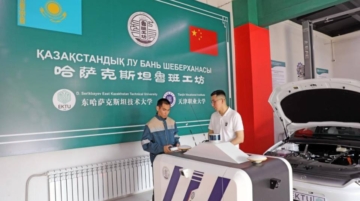
This is a free preview of the upcoming Central Asia Digest, part of the new CGSP Intelligence service launching in Summer 2025.
This week’s developments highlight the intersection of China’s digital technology capabilities with Central Asia’s urgent modernization requirements across financial services, urban management, data infrastructure, and space technology.
The simultaneous advancement of payment systems, smart city solutions, data centers, and satellite communications reflects both Chinese companies’ international expansion strategies and regional governments’ efforts to build modern digital economies.
This week in China-Central Asia news:
Top Kazakh bank signs up with China’s UnionPay
Kazakhstan’s private Bank CenterCredit became the country’s first bank to enable card-to-card transfers through UnionPay International, a Chinese state-owned financial services company. The service allows users to send money from Kazakhstan to China and other countries using UnionPay cards.
Why This Matters: Kazakhstan’s launch of card-to-card transfers addresses a critical infrastructure need for the country’s massive $43.8 billion annual trade relationship with China. The service provides practical benefits like real-time mobile transfers, reduced fees, and direct currency conversion for the substantial flow of B2B payments, remittances, and trade settlements between the two countries.
This development simultaneously advances China’s strategic objective of exporting “Chinese solutions” in digital payments infrastructure while establishing an alternative global payment network that reduces both countries’ dependence on Western card systems like Visa and Mastercard, creating financial resilience against potential sanctions or network disruptions that could otherwise threaten the continuity of China’s export-driven economic model and Kazakhstan’s trade-dependent growth.
Chinese Firm Plans 600 MW Data Center Complex Across Two Uzbek Regions
The private Chinese company Shanghai LinkWise Data Intelligence Co. signed a memorandum of understanding with Uzbekistan’s Energy Ministry to develop two large-scale data centers, each with 300 MW capacity, in the southern regions of Bukhara and Surkhandarya.
Why This Matters: For Uzbekistan, this development supports the country’s “Digital Uzbekistan 2030” strategy by enabling high-performance computing, secure data storage, and efficient processing necessary for AI development, e-government services, and digital business growth. This infrastructure will attract foreign investment, support export-oriented IT companies, enhance cybersecurity by keeping data within national borders, and improve digital service reliability.
For China, placing facilities in Bukhara and Surkhandarya strategically cuts latency for 75 million Central Asian users compared to hosting in mainland China, giving Chinese cloud providers (like Huawei Cloud) a competitive edge in delivering AI and e-commerce services. Moreover, it diversifies China’s data infrastructure away from coastal vulnerabilities and counters Russian tech influence (e.g., Yandex) in a region where Beijing aims to dominate 5G and digital standards.
Kazakhstan and China Establish $3M Joint Satellite Ground Station in Almaty
Kazakhstan and China agreed to jointly construct a satellite ground station at Al-Farabi Kazakh National University in Almaty, developed in partnership with two Chinese research institutions (Hainan Satellite Data and Application Research Center and Northwestern Polytechnical University).
Why This Matters: This project gives Kazakhstan sovereign access to satellite data, allowing real-time monitoring of its farmland, borders, and environmental issues like the Aral Sea—reducing reliance on foreign providers.
For China, the station enhances its satellite coverage in Central Asia and reduces data delays along its western frontier. The project also positions Chinese firms to tap into Central Asia’s expanding satellite data market.
Tashkent Partners with Huawei for Smart Transport Surveillance System
Uzbekistan signed a cooperation memorandum with Huawei Tech. Under the agreement, Tashkent’s public transport system will launch a pilot project to install hardware and software solutions for photo and video traffic law enforcement.
Why This Matters: Huawei’s smart city project in Tashkent marks a significant export of China’s surveillance technology to Central Asia. Expanding beyond telecommunications, Huawei is embedding AI-powered systems to reduce traffic accidents and optimize public transport using real-time crowd analytics.
This places Huawei at the center of Tashkent’s urban mobility infrastructure, creating long-term technological dependencies. The project also serves as a flagship reference for China’s integrated smart city solutions—combining hardware and AI software—to support Huawei’s global expansion in the public safety and surveillance sector.
Beyond improving mobility, the initiative introduces a comprehensive urban monitoring system with capabilities for vehicle tracking and potential individual surveillance. This deepens China’s digital footprint in the region and reflects a broader strategy of exporting surveillance infrastructure.
In Context
This week’s developments underscore the deepening integration of China’s digital ecosystem with Central Asia’s modernization ambitions. Regional governments, eager to upgrade financial systems, urban services, and data infrastructure, are turning to Chinese firms offering end-to-end solutions that are fast, scalable, and cost-effective. In return, China gains access to new markets where it can deploy and test its technologies, export digital standards, and solidify its influence through integrated infrastructure.
While this offers clear efficiency gains and modernization benefits for Central Asia, it also introduces new risks on data sovereignty, systemic dependency, and limited diversification in a sector increasingly tied to national security and economic resilience.
The takeaway: China-Central Asia digital cooperation is driven by mutual benefit. Chinese firms gain global traction and strategic depth, while Central Asian states receive rapid access to advanced technology. However, the digital domain brings with it a deeper level of entanglement than previous waves of infrastructure development.
As Chinese systems become involved in core public services, mobility networks, and data architectures, Central Asian countries must develop robust regulatory frameworks and diversify partnerships to safeguard their strategic autonomy.
Yunis Sharifli is CGSP’s Non-Resident Fellow for Central Asia.




